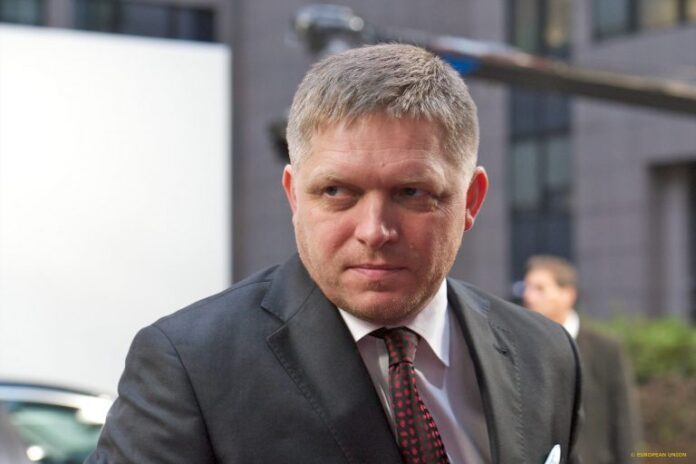The leaders of three political parties in Slovakia – pro-Russian and populist Smer, social democratic Hlas, and ultranationalist Slovak National Party (SNS) – have agreed to divide ministerial seats in the new government by signing a coalition agreement. Robert Fico (SMER – Direction), Andrej Danko (SNS), and Peter Pellegrini (Hlas – Voice) came to a consensus on the functioning of the coalition redistribution of government posts. They confirmed Slovakia’s foreign policy orientation towards NATO and the European Union.
Following signing the contract, Robert Fico plans to submit the names of potential new ministers to President Zuzana Čaputová. However, the candidates must first gain approval from the party’s internal bodies, a process expected to occur in the coming days. The nominees of the Slovak National Party could potentially pose a problem for the coalition government.
The three parties agreed to form a coalition government on October 11. The new government will replace the caretaker government, which has been friendly towards Ukraine.
Robert Fico’s party, which secured the highest percentage of votes (22.9%) on a pro-Russian and socially conservative platform, is reportedly set to lead several departments, including defence, transport, finance, foreign affairs, justice, and agriculture. Furthermore, Fico is expected to become the next Prime Minister.
HLAS, who secured 14.7% of the votes in the October 6th election, will reportedly lead the interior, economy, labour, digitalisation, education, and health departments. The party will also hold the position of Deputy Prime Minister for the recovery and resilience plan and the use of EU funds. Peter Pellegrini, HLAS’s leader, will be appointed as the chair of the Slovak Parliament.
The smallest of the three coalition partners, SNS, with 5.6% of the votes, will reportedly lead the environment, culture, and the new Ministry of Sport and Tourism, which will be established next year.
According to a press release of October 16, the HLAS presidency approved the party’s nominations for the post of chairman of the National Council of the Slovak Republic and the posts of ministers in the new government.
Who are the partners
However, despite the assurances about the pro-EU stance of the new government, there are still many concerns regarding the freedom of the press, the rule of law, social inclusion issues, and the ties of SMER and SMS with Moscow.
Before the elections, senior members of both SMER and SNS political parties expressed their disapproval of Ukraine and showed support for Russia. Fico said Bratislava would stop providing military aid to Kyiv. Consequently, President Caputova refused to support further aid for Ukraine, stating that she must respect the election results.
In March 2018, Robert Fico resigned from prime minister after the assassination of investigative journalist Ján Kuciak and his fiancée Martina Kušnírová on February 21. In 2020, SMER lost the general elections, leading to a pro-EU coalition government. However, on 15 December 2022, the Slovak government lost a no-confidence vote, and the President of the Republic called for a snap election on 30 September 2023.
The country is among the EU member states with higher corruption levels. SMER, a member of the Party of European Socialists until a few days ago, represents a threat to the rule of law and media freedom. Robert Fico repeatedly called journalists “filthy, anti-Slovak prostitutes” and “idiotic hyenas”. In addition, Fico promoted homophobic views.
In some regions of the country where the SMER party controls local administrations, concrete walls were built in the mid-2010s to physically separate the “white” citizens from the “Gypsy” community. Shockingly, this discriminatory practice was widely accepted as an “administrative fact”; unfortunately, the PES leadership failed to condemn it at the time.
The far-right Slovak National Party was founded in 1989 and has had seats in every parliament since then. It has even been a partner in coalition governments twice. However, when it formed a coalition with Robert Fico’s party, it resulted in a disaster for the latter because the Party of European Socialists (PES) suspended SMER’s membership as they believed that SNS was inciting racial or ethnic prejudices and racial hatred. In 2016, the party’s leader, lawyer Andrej Danko, became the Speaker of the National Council of the Slovak Republic.
HLAS’s leader Pellegrini has stated that his party, a more moderate faction of SMER, will guarantee the continuity of Slovakia’s foreign policy. One of the clauses in the recent coalition agreement among the three political groups was a declaration of Bratislava’s commitment to maintain its pro-EU and pro-NATO stance.
No PES members in Slovakia
The situation in Slovakia has become even more complex as SMER and HLAS have lost their international affiliation. On Thursday, the Party of European Socialists suspended Robert Fico’s SMER and Peter Pellegrini’s HLAS party after concerns were raised about their government coalition, which includes a far-right party, and due to the apparent deviation from the values of the PES family shown by SMER-SD leader Robert Fico.
After the agreement with the far-right Slovak National Party, the PES presidency suspended three Slovak members from their group. The S&D group’s bureau will meet in Strasbourg on October 17 to discuss the suspension. The recent public comments and positions taken by SMER and HLAS party leaders on the Russian war against Ukraine, migration, the rule of law, and the LGTBIQ community have raised serious concerns and do not align with the progressive family’s values, as stated in the group’s press release.

